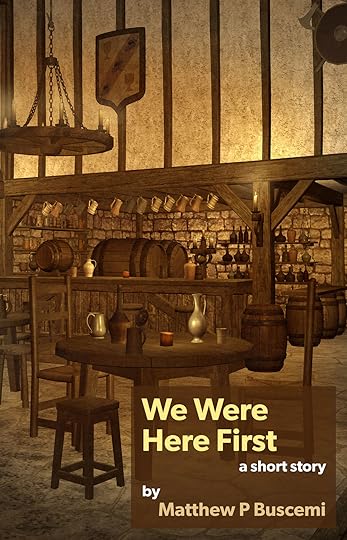Matthew Buscemi's Blog, page 28
December 7, 2015
Short Stories Coming to Amazon in 2016
I've long been a holdout against publishing things to Amazon. I don't like their monopolistic behavior, and I don't like the way that they and their customers both treat writing as a commodity rather than an art.
All the same, I'm going to rollback my stance, at least for a bit, and try to see if there exists any functional audience for my work within that space. If I discover a group of sensitive, intelligent readers through the Amazon Kindle platform, I will happily eat my words.
In January of 2016, I'll be publishing the ebook versions of both Lore and Logos and Schrödinger's City to Amazon, as well as seven short stories, five of which are previously unpublished: Adaptive, Lunar Eclipse, Right and Proper, Rune-Driven Spellcraft, Temple of the Setting Sun, We Were Here First, and Xenosociology.

Adaptive

Lunar Eclipse

Right and Proper

Rune-Driven Spellcraft

Temple of the Setting Sun

We Were Here First

Xenosociology
All of these stories will appear in print in my upcoming short story collection Transmutations of Fire and Void, which is currently slated for a March release at Fuzzy Hedgehog Press.
The target release date for the seven short stories on Amazon Kindle is January 4.
December 5, 2015
Writing Challenge
(This article was first published on zacharybonelli.com on January 1, 2015. It has been revised with only minor editorial changes.)
Yesterday, I finished my first draft of Schrödinger’s City, just in time meet my 2014 deadline for myself.
The genesis of that novel involved a confluence of two events: 1) A friend noticed that my first three novels tended to involve the viewpoints of a lot of gay, male programmers in their teens or early twenties, and while it was great to push genre boundaries, I was perhaps beginning to repeat myself somewhat. 2) I read Perdido Street Station by China Miéville, which was a watershed moment for me. Within that novel, many of the rules of writing, as defined by many writing groups I participated it and the many blogs I frequented, were summarily ignored throughout. And yet the novel was beyond a shadow of a doubt successful, a thoroughly engaging work of literary art. This caused me to question every writing rule I had ever been exposed to, especially the ones I had never had much respect for in the first place.
And so I sat down and wrote a novel with roughly twenty point of view characters, all of varying genders, ages, backgrounds, cognitive strengths, weaknesses, fears, worldviews, etc. I even wrote my villains’ points of view, albeit briefly. Even the writer (especially the writer) could only tolerate them for so long.
I like my draft. A lot. Editing it will be hell, but editing has always been hell, regardless of how much I like a work.
This brings me to my challenge for other writers. Once you know what a rule is and why it exists and how to follow it, then break it, and then ask yourself how that feels.
I have met developing writers who have admitted to me that they don’t understand, conceptually, what point of view (PoV) is. They can’t read a piece of writing and say to themselves, “clearly the PoV is Mary,” and neither can they hold a PoV in their own writing because they can’t comprehend what it is. Such writing will, without a doubt, be painful to read.
However, once a writer can read someone else’s scene and say immediately, “the PoV was Bob,” and once a writer can write a scene herself and hold a PoV on purpose, then the writer needs to start practicing breaking the rule, if only to find out what effect breaking the rule has.
And never let another author tell you how to write, especially if his reason is, “I really hate reading authors who do X.” Screw him. He has a valid point with regard to people who are doing it blindly, but what about the people who understand how that feels and explicitly want to evoke that feeling?
Science fiction is supposed to be the literature of new ideas. We are supposed to revel in pushing boundaries, in getting people to conceive of new things. If so, why do we blindly follow rules? Ours should be the literature that elegantly breaks every last one of them.
This year, I will become more experimental. I will try even more new things. I will explore even more types of characters and attempt stylistic constructions that will drive purists into a fiery rage.
And I will enjoy every minute of it. I encourage you to try the same.
December 3, 2015
Review: That Hideous Strength by C. S. Lewis
It was entirely unintentional that I placed That Hideous Strength immediately after The Man Who Japed in my reading schedule. Both novels tackle totalitarianism, but, Lewis takes a stance altogether different from Dick. Of course, in a Lewis novel, there must be a metaphor for God, that absolute which, not being of the power of man, can achieve absolute good.
Mark Studdock is an up-and-coming academic at well-respected university in England of the 1940's, some few years after the end of the Second World War. He looks forward to his placement in the tenure track, up until he is approached by representatives of the National Institute of Coordinated Experiments (NICE). These representatives draw him slowly and gradually into their fold, never with outright coercion, but certainly through well-timed manipulation. The deeper Mark becomes embedded with NICE, the harder it is to leave, and the easier it becomes to justify behaviors he would have deemed immoral under other circumstances.
NICE is pitted against St. Anne's, an institution that has aligned itself with Dr. Ransom, the series mainstay. The subsequent conflict involves more biblical allegory than there is room to describe here. NICE takes on the demonic elements, while St. Anne's becomes aligned with the angelic.
Whereas the modern take on totalities is, "never totalize anything," Lewis's take seems more like, "align yourself with the right totality." Lewis's is an ideology that is humanistic at its core, and this contrasts starkly with NICE, which is dominated by mechanization, regulation, and control, and indeed most of science fiction, whose demographic largely would not bat an eye at cybernetic enhancement or life extension. Lewis would be quick to point out that such actions glorify the perpetuation of the scope of power of the self, and remain blind to the damage such change have on an individual's core humanity. What is the purpose of living forever if one's humanity is lost in the process? The joy of the novel is that this very conflict thrives within all of our actions as human beings.
That Hideous Strength deftly explores these actions through the conflict between NICE and St. Annes, and adds a parallel struggle for Mark as he discovers that while he has slipped into an alliance with NICE, his wife has actively chosen an alliance with St. Anne's.
And therein lies another brilliant allegory. Any human group or institution worthy of membership will be picky about selection, and hesitant to accept. Only a toxic group coerces its members inward through manipulation, shame, and fear.
Though Lewis's philosophy is very old, it rings with the truth of the ages, and it is an important ideological weight, one that balances the extremes of our modern age quite nicely.
December 1, 2015
Developmental Experience
(This article was first published on zacharybonelli.com on December 28, 2014. It has been revised with only minor editorial changes.)
I almost began this essay with the phrase, “when I was a younger writer.” The moment I saw those characters on the screen, I knew they were not quite genuine. I was not setting out to describe myself at sixteen. More like three years ago. My development as a writer during that time has been extraordinary. And yet there is still so much more to explore and learn.
When I was a three years younger writer, I naïvely bought into two implicit assumptions about writing. The first was that there exists a single spectrum of skill from novice writer up through master. The second was that I could acquire developmental experiences such as writers’ groups, classes, and workshops, and that those experiences would bestow development upon me.
It’s funny to me now that I still held on to the second misperception. My experiences with graduate school should have already instructed me in the folly of that particular ideology.
But let me start at the beginning. During my first year of attending my local science fiction writing group, I simultaneously watched the Amazon self-publishing hysteria dissolve into the dismal realization that very few people were ever going to see any fair compensation for their work from self-publishing, and the ones who did would not receive modest pay, but wealth beyond their wildest dreams. The individuals visible to me went right on to abuse the status and popularity afforded by their “good” luck. There’s a story that’s as old as humankind.
At the same time that my starry-eyed delusions of a new kind of marketplace for writing were evaporating, my first writing group was also changing my conception of quality in writing. The more I attended, the more I realized that my goals as a writer, my conception of what it meant to “write well,” was completely different from that of many other group members. Neither of us was wrong or right. We merely wanted different things from writing.
That was an incredibly freeing realization, because I would later extend it to market systems—it’s perfectly okay to not want to achieve the kind of quality that leads to bestseller status, as long as you’re aware of that and accept all the consequences thereof.
Quality exists along multiple vectors. There are as many different kinds of writing as there are different kinds of human ideologies and worldviews. That diversity is a good thing. It’s what keeps literature rich and vibrant.
But that means that a writer can’t carry around the idea that he needs to follow the straight road that leads to perfection. It’s not a single road, and the multitudinous paths weave and warp, and are littered with dangers and dead ends.
As for the second implicit assumption, that increased skill was something bestowed upon me by my experiences, that took longer. I have a feeling that our materialistic culture encourages us to think this way. Experience is something we “get.” Even our educational systems encourage this kind of thinking—degrees are bestowed upon us when we graduate.
But there’s a different way to think about personal development. Rather than viewing experience as the pouring of knowledge and skill into us, it is far more accurate to say that growth and development is something we draw out of our experiences.
A friend and I were having a discussion about literary depth recently, and something he said struck me as remarkably resonant. To paraphrase him: depth is not something contained within a work, but rather, it is a way of approaching a work in which the reader searches for meaning.
Gaining skill and ability is something you draw out of your experiences with hard work and effort, not something your experiences confer upon you.
Here’s a concrete example. Early on in my critique group experiences, I took home the written feedback others gave me, and I immediately incorporated all of their corrections and suggestions into my writing.
At a certain point, I began to notice that certain changes were completely incongruous with what I had intended to express. I started asking critiquers to tell me why they had made changes alongside the changes themselves.
This made me an infinitely better writer than just accepting changes from others. Only with this new, crucial information was I able to gain an awareness of the dissonance between what I had intended to communicate and what others were experiencing when they read my work. This should be a fairly universal goal for any kind of writer: that your message, with all its nuances, is reaching your audience as intended.
Large parts of this post arose from a a discussion I partcipated in at the Speculative Fiction Writers Google+ Community. A big thank you to everyone who participated in that discussion for supplying me with your insights and for giving me the opportunity to explore my ideas on this subject.
November 29, 2015
Review: The Man Who Japed by Philip K. Dick
When one mentions totalitarianism, it is usually the autocratic dictatorship that comes to mind. However, totalitarianism also functions on the complicity of the masses, and it is this mass complicity that is the target of Dick's ironic humor in The Man Who Japed.
Allen Purcell is on his way to a promotion from his position as head of major media organization directly into the Morec ("moral reclamation") government as overseer of cultural propaganda. One of the most sensitive positions, it requires the utmost adherence to morality, which Purcell has indeed upheld his whole life.
There's just one problem. Purcell has recently decapitated the statue of General Streiter, founder of Morec, and he has the head hidden in his apartment. Even worse, he doesn't know how or why he did it. Just that the statue head is there, so surely he must be to blame.
Even the least successful efforts from Dick bring an important theme to the table, and the targets here are spot on. Dick blends America's puritanical streak with a totalitarianism reminiscent of the 1930's and 40's Europe and the result is the Moral Reclamation government, complete with ridiculous toadies willing to repeat whatever propaganda is fed to them, as well as judgmental committee law, in which accusers can have their voices modulated so that the accusee will not know who they are.
And while these efforts provide a solid foundation, the rest of the novel feels rather slapdash. As Purcell attempts to discover what made him decapitate the statue, he is drawn into the resistance to the Morec government, and these sequences don't quite hit their mark. They feel injected to move a plot (any plot) along, rather than integrated into the central theme of the work.
All in all, there are some memorable scenes. One poignant moment involves the reminiscence of one of Purcell's friends, who sells him out to the committee in order to get a better living space. The scene of Purcell's "trial" was also well rendered. I recommend it as a window in the political mental space occupied by intelligent, discerning individuals of half a century prior, and a adept takedown of totalitarianism, though that argument feels quite thoroughly fought and won.
November 27, 2015
Accelerating Toward Oblivion
(This article was first published on zacharybonelli.com on December 23, 2014. It has been revised with only minor editorial changes.)
“Contemporary society is, therefore, ‘rich in lived events but devoid of experience’ (emphasis added) because ‘it becomes difficult to integrate developments into cultural world pictures, narratives, educational institutions, and patterns of interpretation.’ We get, instead, ‘the increasing fluidity and ephemerality of fashions, goods, work processes, ideas, and images.’ We get ‘not the end of the world, but the end of meaning.’ We get the experience of ‘frenetic standstill,’ the state where ‘nothing remains the way it is while at the same time nothing essential changes.’ Life, Rosa explains, ‘can no longer be understood as directed motion and narratively constructed in the sense of a history of progress or development. Life doesn’t head anywhere; in the end, it goes nowhere (very fast).’”
Alexander Zubatov, I Loved You, I Loved You: A Farewell to Art in The Hedgehog Review Fall 2014
Zubatov quotes heavily in this passage from German sociologist Hartmut Rosa and his book Social Acceleration: A New Theory of Modernity. This is the central idea of Zubatov’s essay, but it deserves further unpacking.
In the times before the nineteenth and twentieth centuries, one major problem human cultural development faced was the lack of infrastructure with which to provide individuals enough time and context to study society, come up with a critique or analysis, integrate that into their worldview, propose something new, and disseminate it to others in a similar position to consume it, integrate it, and refine it. In a sense, the world was “moving too slowly.” In the same way that technological innovations were either repressed or destroyed (requiring reinvention), social innovations, too, suffered a very similar fate. Artistic development and literary tradition are built in the same style as technology—humans take what has come before, add something of their own ingenuity, and craft something new. The displines and skills involved differ, but they follow the same basic process.
However, social development differs significantly from technological development in that it requires more time for a sensitive individual to integrate emotion and metaphor and observation into a coherent worldview. Most importantly, cultural depth (also called wisdom), increases as one is better able to build a coherent picture of the past. The more epochs and genres and experiences an individual has to work with, the greater will be his contribution to the social expression of his own art.
Technological development has no such limitation. The twentieth century saw technological progress accelerate exponentially. Most new technical innovations require only the synthesis of the techniques that came immediately prior, combined with a novel idea or observation in the present. To use computer programming as an example, I don't need to know microprocessor programming in order to code a web server. Neither does technological innovation require as lengthy a “ripening” period. A new technological development can be built and tested roughly as soon as the prior innovation has been completed.
Technological development largely spurred on the arts in the seventeenth and eighteenth centuries by improving human resilience to disease and injury, and providing better and faster avenues for communication and collaboration. Essentially, technological development sped up the “cycle time” of community intellectual thought, making cultural developments, such as art, “stick better” and reach wider audiences. But by the twentieth century, the ever-increasing velocity of the cycles morphed into art’s enemy rather than its benefactor.
In our modern culture, we are bombarded endlessly with input: Facebook, Twitter, blogs, feed readers, work, exercise, socialization, coworkers, games, advertisements, music over intercoms, emails, cell phones, and on and on and on. We are put under social pressure to experience as much of this deluge as possible. Failure to recognize the most recent pop culture trends can become a stigma in many social circles. This is Zubatov’s “going nowhere very fast.” All of life’s facets endure constant change, but none of that change actually matters in the grand scheme of things.
And this why I maintain that my position on cultural tunnel vision is not elitist stance, but rather a warning that is pragmatic in the extreme. Perhaps, as our cultural and technological cycles approach maximum velocity, and, simultaneously, as the average human attention deficit reaches maximum entropy, we will arrive at the death of meaning itself. At the point at which an individual views his own tastes as entirely self-defining and infinitely meaningful, then paradoxically, so will his universe and his life cease to have any meaning whatsoever.
Zubatov calls for like-minded individuals to create “islands of deceleration,” in other words, enclaves where art thrives that is slower and more gradual, which builds upon the traditions of the important works that came before it, that demands empathy, that demands deep, meditative thought, that demands significance. If you can develop an interpretation of The Hunger Games, Game of Thrones, or *chortle* Billionaire Dinosaur, that fits them into such a framework, I’d be happy to consider its validity, but my suspicion is that these popular culture phenomena are what Zubatov refers to as the “fizzy sea…of mass ignorance.”
For what it’s worth, I honestly hope that my technologist friends are right. Perhaps we can speed up societal cycle time and feel no ill effects within our culture. But my gut tells me that art and history, that a philosophical and intellectual connection of our present culture to its past matters. Its loss will be, as Zubatov suggests, akin to a new kind of dark age, one characterized by frenetic, unmanageable excess of experience rather than the punishing dirth of it.
I’ll get started on my island.
November 25, 2015
Review: The Word for World is Forest by Ursula K. Le Guin
If we do not learn the lessons we ought to have from the era of colonialism, we risk repeating those follies all over again when we take to the stars.
The planet Athshe is a veritable paradise. Small continents and a multitude of island chains dot an oceanic globe. The natives are short and green-furred; they live in relative peace, at least until “yumens” arrive in spaceships and begin setting up military bases and founding cities on their planet.
The narrative pits an xenologist who slowly begins to empathize with the Athsheans against a military commander bent on dominating everything he can see. The Athsheans, seeing no good way out of their predicament, slide out of their harmonious existence, and come to grasp a mindset of “othering,” whereby they decide that the humans, not demonstrating any basic moral or ethical code toward them, deserve exactly the same in return.
The Athshean culture is particular well realized, and Le Guin does an excellent job of bringing us inside the hearts and minds of individuals in that culture, an element of come to expect from Le Guin's writing. As is also typical for Le Guin, the economy of words is upheld at every turn, and each sentence and paragraph is loaded with meaning. I am certain I will come back to Forest in a few years and discover as much new meaning as any other Le Guin novel I've tried this with.
Although the themes remain timely and apt (Forest was written during the Vietnam War, but it could also describe the Iraq War or any number of ongoing US military activities), the text does not maintain the dialectical rigor I've come to expect from Le Guin. Davidson, the military commander, has far less humanity than I expect any military officer in the real world to possess. He is much closer to a stereotype than a fully realized character. And the Athsheans being endowed with built-in empathy as a result of a telepathic link with other members of their species feels a bit too convenient.
All in all, The Word for World is Forest is a compelling novel with an important theme at its core, a warning that can be extrapolated to any individual or group who finds themselves in a position of power over others.
November 23, 2015
Toxic Feedback
(This article was first published on zacharybonelli.com on December 18, 2014. It has been revised with only minor editorial changes.)
As the leader of a writing group, I’ve come to notice that the biggest apprehension people bring into their first group experience is the worry that they are not good enough to even participate. They worry that they will be wasting the time of writers who are more experienced and talented than they are.
Such a writer occupies a vulnerable moment in her development, one where she has only just barely gained the confidence to get herself the feedback that she needs in order to improve.
Toxic feedback occurs when feedback is given in such a way as to send the writer hurtling back into the safety of isolation. The only thing accomplished in such a situation is that the writer will fail to grow. Toxic feedback is a form of verbal and emotional abuse.
Some individuals will argue that such abuse is “necessary.” That in order to get better, writers need to develop a “thick skin.” Besides, future reviewers aren’t going to spare anything on the writer’s feelings. Why should feedback givers?
I’ll grant that the world is burdened with unprofessional, anti-social reviewers (and, to be fair, a good number of reviewers are professionally critical, too). But being a published author confers status and confidence, both of which blunt the pain of scathing critique. A developing writer possesses neither. Do we throw children out of planes with no training or instruction because they've expressed an interest in becoming professional, adult parachuters? No. The idea that we should intentionally abuse a weak group member in order to “toughen her up” is patently ridiculous.
Another argument from those who want to give more “traditional” feedback to developing writers, is that they believe that the only way to express their reaction to the piece is abusively. I find this claim even less comprehensible than the last. I would never argue to my boss at my software engineering job, for example, that it was necessary for me to flip over my coworker’s desk and yell at her about what shitty code she wrote, rather than ask her if she could spend some time walking me through her contributions to codebase and discuss them calmly with an open mind.
You do not have to say abusive things in order to express yourself, in any context. There is always a healthier way to structure your interactions with a person, and each writer you critique deserves at least that much respect.
Having established why one should not engage in toxic feedback, I'll move on to how to recognize it, deal with it, and make sure you don't engage in it yourself.
Out-and-Out NastinessThis the most obvious and visibly toxic feedback, when the critiquer chooses to belittle the writer directly, or when he belittles the writer indirectly by insulting her characters or illegitimizing her descriptions.
There is also a class of common criticisms that, while they could be part of healthy feedback, become abuse if the feedback giver’s ego gets involved. This involves taking a reader reaction, which could be healthily expressed as such: “These few paragraphs didn’t hold my attention” but reconstruing it to raise the critiquer’s ego at the expense of the writer’s: “These paragraphs were boring.”
Notice that the primary difference between those two statements is that the former is a statement of fact regarding the reader’s experience with the piece, whereas the latter statement carries two implicit assumptions: 1) the reader’s opinion is of more importance than anything the writer might have been trying to accomplish with the piece, and 2) the reader is superior to the writer.
Any and all feedback can be recast without ego games and abuse. When you give feedback, ask yourself whether you’re explaining your reaction or talking down to the writer from a presumed point of superiority. Check that attitude at the door when you give feedback. If you find you can’t, then do the group a favor and politely check yourself out of your writing group.
Feedback StructureMost people aren’t nasty, hostile, and condescending. Even if a feedback giver is empathizing with a writer and describing his reactions in a non-abusive way, there are still traps that he can fall into through lack of attentiveness. These are mostly due to unconscious reactions human beings have to feedback.
One of the biggest mistakes is to start negative. Never do this. Always start with the positive elements first. It is important to have something positive to say about the piece. Very few pieces of writing in the world are devoid of merit or redeeming value.
The human emotional core will latch onto the beginning of an interaction in ways that no one can control. By starting with negative feedback, the reader’s initial negativity will infect the rest of the interaction. By starting with the positive feedback, he can make the writer more likely to take his advice seriously when he later mentions elements he thought could be improved. The writer will be much more receptive to that feedback if the critiquer starts with the good stuff, and leads into the meat of the critique later.
It also important to end a critique on a positive note. The writer should feel compelled after receiving feedback to write more. To that end, it is important to end criticism with either a summary of the positive elements, or new positive observations. But never end with a general statement, such as “this was good,” or “I liked it.”
The human brain is hardwired to believe other’s words when the statement is specific, and disbelieve them when the statement is general. Even if the critiquer really did think the piece was good, and even if he really did like it, saying so in such a brief and contrite way at the end of his feedback cannot help but come off as disingenuous. He doesn’t have to repeat everything, but he should choose something, and something very specific to comment on.
Positive ThinkingIt’s natural to approach critique with the intent to criticize, to raise the writer’s awareness of the parts of the story that the critiquer felt didn’t work so well, or which worked contrary to the author’s intent. This is all part of good critiquing.
However, there is a counter-intuitive element of critique that is just as useful for raising the writer’s awareness as is expounding upon the ways in which the story misfired—a good critiquer will focus intense scrutiny on what worked well and why.
This is the perfect way to utilize the finale of a critique. Don’t just say positive things about the story for the sake of going through the motions. It is equally useful for a writer to know which elements of their writing are working well as which elements are not. This more than anything will get a writer thinking about how they can take their writerly strengths to the next level.
This ties into one of the greatest truths about human psychology: we learn much better from being praised for success than from being criticized for failure.
If you’re interested in learning more about constructive criticism, you should check out Joni Cole’s book, Toxic Feedback. You can also check out the code of conduct for the writing group I run, The Wordsmithy.
November 21, 2015
Review: The Four-Day Weekend by Serdar Yegulalp
“Nerd.” Both a badge of honor, and often a reminder of painful social isolation. But what does it mean exactly? It often describes a combination of eccentricity and an interest in media and activities that defy social norms. Which begs the question, why do we like what like? And when you like a thing that is obscure, why is it important to seek out a broader community, if your local one won't do? Here to explore such questions and some potential answers is The Four-Day Weekend by Serdar Yegulalp.
Henry and Winthrop are best friends who each find themselves in something a rut. Henry's just been dumped by his girlfriend, and the comic book store that Winthrop runs has become a daily grind, one which has been bringing in less money year over year. In the midst of this, Henry remembers that he'd signed them up for the Baltimore comic convention the year before, and the two of them decide to get away from it all.
The genre here is realism, not speculative fiction, and thematically, we head deep into the territory of why people like what they like, and most importantly, what responsibilities does “liking” a thing entail? The simple answer our culture proscribes is that a person just likes what they like and they shouldn't think about it too hard. And while this attitude is very convenient for big business, which wants volume, it's less great for “fans,” since any level of passion about a thing will prompt caring, which will prompt in-depth exploration, which will inevitably lead to critique, and that will ultimately lead to nuance and sensitivity to details that non-fans overlook.
The novel's locus for this exploration is Diane, who has not intended to join the convention, but runs into Henry by accident after breaking things off rather abruptly with her fiancé. Henry invites her into the fold although she knows nothing about manga, anime, or Japanese culture, but as Henry and Winthrop learn, those with an open mind can appreciate the universal elements of an art that has been curated for an open-minded initiate.
The narrative style is crisp and direct, and the appropriate amount of emphasis is given over to characters' emotions and thoughts. The theme eschews simple answers, and dives into complexity instead. Besides the central cast of three, there are others, existing friends and newcomers both, who each help explore a facet of fandom.
There is no action here of the plot-driven sort, but rather a philosophical exploration in the form of narrative prose, and one executed superbly. I can recommend The Four-Day Weekend wholeheartedly to anyone interested in its themes.
November 19, 2015
Perelandrian Dream
(This article was first published on zacharybonelli.com on December 17, 2014. It has been revised with only minor editorial changes.)
“He [Dr. Weston] was a man obssessed with the idea which is at this moment circulating all over our planet in obscure works of ‘scientification,’ in little Interplanetary Societies and Rocketry Clubs, and between the covers of monstrous magazines, ignored or mocked by the intellectuals, but ready, if ever the power is put into its hands, to open a new chapter of misery for the universe. It is the idea that humanity, having now sufficiently corrupted the planet where it arose, must at all costs contrive to seed itself over a larger area: that the vast astronomical distances which are God’s quarantine regulations, must somehow be overcome. This for a start. But beyond this lies the sweet poison of the false infinite—the wild dream that planet after planet, system after system, in the end galaxy after galaxy, can be forced to sustain, everywhere and for ever, the sort of life which is contained in the loins of our species—a dream begotten by the hatred of death upon the fear of true immortality, fondled in secret by thousands of ignorant men and hundreds who are not ignorant.”
C. S. Lewis, Perelandra
Roughly a century has passed since C. S. Lewis penned those words. I wonder how he’d feel about the fact that “scientification,” as he called it, has more or less won as the prevailing ideology.
The above passage resonated with me, because as a young person I too was very much on board the “humanity can achieve anything it wants” bandwagon. What I really wanted was validation that I could achieve anything I wanted, and that everything I wanted to get was good for me. The science fictional manifestation of the idea is that humanity is destined to spread and evolve and “transcend” (another popular science fiction trope), but what if all that really awaits is a cold, lonely end on this planet? Take a moment to ponder that over. If we presume that instead of infinite expansion of our capabilities as a species, that we will reach and pass an inflection point of raw materials and energy availability, that the scope of humanity’s influence will eventually retract, then what does that suggest about our behavior in the here and now? In my own life, reaching the conclusion that I could not create for myself my imagined “optimal experience” was a very hard pill to swallow, but having to do so made me a better person and gave me a better appreciation for the other people in my life and of life itself.
Lewis lived in a time when the colonial attitudes in Britain would have been nearing their end, but would have remained very prevalent. The missteps and horrors of colonialism were very visible, too, at least to men of Lewis’s social stratum. To him, humanity’s expansion to the stars presented the obvious opportunity for a repetition of the horror. And he perceived how the fantasy appealed to those who wished to resume colonialism, and for whom the human suffering produced by colonialism was eclipsed by the lament that humanity ran out of land and materials and people to exploit.
Surely, this is a mistake of the past, right? No one today is anxious to reenact colonialism, right? Lacking actual interplanetary travel, let’s take a look at the artifacts of our popular culture that simulate it, two recent video games: Pandora and Civilization: Beyond Earth. The premise of both games is that humanity has traveled, through some futuristic means, to a new planet, and must settle, establish cities, and expand near resources to gain strategic power. The colonists you control during these games do all the things you would expect colonists to do—they try to establish cities near the best and largest quantity of resources, and they go to war over control of such lands.
Gene Roddenberry’s ideology, which was that humanity would go to the stars having overcome the colonial impulse, has clearly failed to take root in the popular culture. That could be an essay in itself. For this discussion, I’d like to focus on how each of these games handles interaction with the new planet’s indigenous life.
Pandora features planet-native lifeform units (which I'll call “aliens” for the duration of this article, for simplicity's sake) that spawn from nests and roam the lands. They are mostly hostile by default, and even if you choose the faction that is supposed to be “nature and alien loving,” the mechanics of game progression force you to eradicate the aliens, destroy their nests, and settle their land.
Civilization: Beyond Earth, though the execution of its gameplay is far superior to Pandora’s, fares only marginally better with regard to the treatment of alien life. The game allows the player to choose an “affinity” that is, on the surface, aligned with the biological life of the new planet. While Civilization also features alien nests that spawn alien units, these units are docile by default, but become aggressive if you attack them or encroach upon their land. Aligning yourself ideologically with the aliens brings about the opportunity for you take control of the aliens and use them against your opponents. In other words, Civilization allows you to either kill the aliens or use them as a tool for your own ends. Never is the sentience or independence of the aliens established or respected. The player cannot win by building up the aliens, only by building something called a “mind flower,” which supposedly links humanity and the aliens telepathically. I’d argue that the side that comes out dominant in this linking is abundantly clear.
Who knows what would actually happen if we gained the capacity for interplanetary travel tomorrow. Whatever the case may be, our popular media of today does not bode well for the outcome.
Our society seems obsessed with its future right now. It’s as though we’re struggling with two incompatible truths: the ideology of science is telling us to expand and consume and get what we want and that we’re our own gods, everything else be damned; and yet, the facts that science is presenting us with—the degradation of our environment and the alarming rate at which we are burning through natural resources—suggest that we are on a collision course with an inflection point, if not out-and-out catastrophe.
The movie Interstellar, by my interpretation, is just such a conundrum. Near the middle of the film, we reach the reveal. The scientist, whose plan, once he finishes it, will save humanity from the confines of a deteriorating Earth, has lied. For years, he has led people to believe that his plan’s solution is imminent, but in fact, the problem is unsolvable. Science cannot perpetuate our comfort any further. There is only us, here on Earth, now. The father and daughter mattered. Their family mattered. Dipping around with toys in space did not matter, and the father naturally languishes in this regret for some time. I felt the moment and sentiment were executed well, and I was ready to applaud the film’s message… until the end. The final half hour left much to be desired—the father discovers the missing scientific data, perplexingly enough, from within a black hole, an experience which he equally perplexingly manages to survive. This data, whatever it is, allows humanity to launch enormous complexes into space that can indefinitely house humanity. And with that, the father’s abandonment is absolved and the futility motif is completely undercut. The audience cannot be confronted with the fact that we only get the here and now: one planet, one biome, one fleeting existence. And then the end.
Lewis called this “the hatred of death upon the fear of true immortality.” Indeed.



